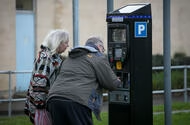The landscape of parking in the UK is undergoing a significant transformation, with many councils opting to phase out traditional coin-operated machines in favor of smartphone apps. While this shift aims to modernize the parking experience, it has sparked a wave of frustration among drivers who find themselves grappling with the reliability and cost of these new digital solutions.
Why Are Councils Moving Away from Coin Machines?
Take Guildford, for instance. Recently, two-thirds of the town’s parking machines were disabled, leaving motorists to rely solely on the RingGo app for payment. Surrey County Council explained that the decision stemmed from the high costs associated with maintaining aging machines and collecting cash. In their view, the financial burden of these machines outweighed the income they generated.
But this transition isn’t without its hiccups. One frustrated driver shared her experience of struggling to connect to the RingGo app, worried about being late for an appointment and facing a potential fine. Another couple echoed her sentiments, expressing their discomfort with technology. They preferred the simplicity of coins or contactless payments, highlighting a significant gap in accessibility for those less tech-savvy.
Are Parking Apps Really the Solution?
While some councils, like Surrey, are pushing for app-only payments, others are reconsidering their stance. Brighton and Hove City Council recently conducted a trial to assess the effectiveness of contactless payment machines, which had been turned off the previous year. The feedback was telling: many drivers expressed a clear preference for the convenience of these machines over app-based payments.
Joyce Collins, a 90-year-old resident, voiced a common concern: “I don’t know anything about apps.” Her experience reflects a broader issue—many individuals, particularly older generations, feel alienated by the shift to digital-only solutions. Christina Westwell, another local, added, “If we have to use an app, we just drive off.” This sentiment underscores the potential for lost revenue as drivers opt to avoid the hassle altogether.
The Frustration with Parking Apps
The dissatisfaction with parking apps isn’t limited to just a few individuals. The AA has noted that many of its members prefer traditional payment methods, such as chip and pin. They express frustration over apps that fail to connect or impose additional charges. It’s a situation that many see as a “real mess,” where councils complicate the payment process while simultaneously increasing costs.
Interestingly, the app RingGo reported a record £30 million in parking fees in 2023, primarily from the fees charged to councils for managing these payments. This raises questions about the sustainability and fairness of relying on apps for parking revenue. Are councils prioritizing profit over user experience?
What’s Being Done to Address These Concerns?
In response to the growing discontent, the Department for Transport (DfT) has initiated the National Parking Platform, which aims to streamline cashless parking by uniting multiple apps under one system. Currently in trial, this platform processes nearly 500,000 parking transactions monthly across 473 locations in the UK. The DfT acknowledges the challenges but emphasizes their commitment to improving the system.
The big takeaway? The shift to app-based parking isn’t about perfection—it’s about smarter adjustments. While technology can enhance convenience, it’s crucial that councils consider the diverse needs of all drivers. For those feeling overwhelmed by the digital shift, taking one small step—like familiarizing yourself with a parking app—could make a world of difference. As we navigate this new parking landscape, it’s clear that finding a balance between innovation and accessibility will be key to ensuring a smoother experience for everyone.

